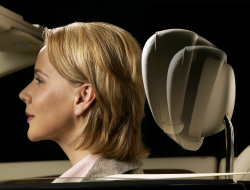— A Mercedes-Benz NECK-PRO lawsuit alleges the active head restraints deploy without warning and without external impacts to the vehicles.
According to the lawsuit, the Mercedes active head restraint is designed to spring forward if a vehicle is hit from behind, quickly pushing the headrest forward to catch an occupant's head and prevent whiplash injuries.
The NECK-PRO restraint will allegedly strike the back of the head of an occupant at a time when the occupant isn't expecting the jolt. The lawsuit also alleges it causes serious bodily harm to the head and neck and distract a driver to the point of causing a crash.
The plaintiffs blame the problem on a cheap plastic bracket that is used for the triggering mechanism, holding a spring-loaded release in place until a sensor indicates a rear-end crash. Mercedes allegedly took the cheap way out with the plastic bracket which cracks and breaks down under the constant pressure of the springs.
The headrest is made with a forward-facing padded surface mounted to a plastic carriage that is loaded by pre-tensioned springs when stowed in the headrest prior to deployment. The carriage is secured in the stowed position by a pin-and-hook latch assembly with the pin secured in a nest in the carriage.
The latch is then linked to the Mercedes electronic computer control unit. The lawsuit says in a rear-end collision, the signal triggers the "pin-and-hook latch to release the pin allowing the carriage to be forced forward by the springs, rapidly deploying the face of the headrest forward."
The device fully deploys in .027 seconds with the face of the headrest sent forward by 40 millimeters and upwards by 30 millimeters to meet the head as it travels backwards.
The lawsuit alleges there are hundreds of thousands of Mercedes-Benz vehicles equipped with the allegedly defective NECK-PRO active head restraints at risk of deploying without warning.
The eight plaintiffs who filed the class action lawsuit claim they wouldn't have purchased their vehicles, or would have not paid as much for them, if they would have known about the NECK-PRO head restraint defects. However, none of the plaintiffs say how much less they would have paid for the vehicles.
Mercedes allegedly should have known the active head restraints were defective but concealed that knowledge from the public while advertising the safety of the vehicles.
In addition to filing suit against Mercedes, the plaintiffs also sued Grammer, the maker of the headrests and active head restraints.
The proposed class action lawsuit includes all current and former owners and lessees of Mercedes vehicles equipped with NECK-PRO active head restraints.
The Mercedes-Benz NECK-PRO class action lawsuit was filed in the U.S. District Court for the Southern District of Florida - Lewis, et al., v. Mercedes-Benz USA, et al.
The plaintiffs are represented by Kozyak Tropin & Throckmorton, Gilligan, Gooding, Franjola & Batsel, Searcy Denney Scarola Barnhart & Shipley, and Santiago Burger.

